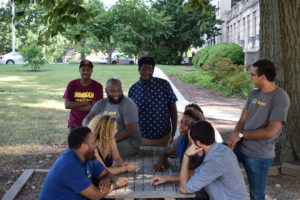Weaving a Bright Future: Baltimore’s Thread Uses Community Resources to Reduce Isolation
This article will appear in the upcoming spring 2019 issue of Children’s Voice.
by Elizabeth Gibbons
Student success depends not only on a supportive academic environment; a holistic, family-, peer-, and community- centered approach can also assist young people who are struggling. The Baltimore-based nonprofit Thread is working to incorporate this approach, engaging high school students who are underperforming and helping them achieve academic, personal, and professional successes. By creating a new social fabric and building strong relationships between individuals, Thread is committed to bolstering core competencies in the students, volunteers, staff, and others that the organization serves—and working to make Baltimore a more equitable city.
centered approach can also assist young people who are struggling. The Baltimore-based nonprofit Thread is working to incorporate this approach, engaging high school students who are underperforming and helping them achieve academic, personal, and professional successes. By creating a new social fabric and building strong relationships between individuals, Thread is committed to bolstering core competencies in the students, volunteers, staff, and others that the organization serves—and working to make Baltimore a more equitable city.
Founded in 2004, Thread specifically identifies high school freshmen who are academically performing in the bottom 25 percent of their class, statistically least likely to graduate, and who face barriers outside the classroom, including unstable housing, financial hardship, and limited social support. The nonprofit provides each student with a team of up to five volunteers—who take on such projects as tutoring, providing rides to school, helping with college applications, engaging in social activities with students, and more—that form a support network and increase students’ access to resources. Instead of using terms such as “student” and “mentor,” the Thread community employs terms such as “friends” and “family.” This focus on family removes perceived barriers and allows for more personal interactions. “We’re really combating social isolation,” says Allison Buchalter, vice president of involvement at Thread. “It’s detrimental to the success of our students, our volunteers, and the community. Building consistent relationships and expanding social networks help open the door to professional and academic opportunities.”
Thread’s volunteer teams are customized for every student’s needs; students are guaranteed ten years of support, through high school and beyond, and are never unenrolled from the program. The interconnected “Thread families” provide crucial support and foster academic advancement and personal growth for students who are vulnerable. This model is based on the conviction that “empathetic and enduring relationships are our society’s most essential form of wealth.” “We don’t believe in the societal concept of ‘haves’ and ‘have nots’,” says Buchalter. “Instead, we recognize that the creation of strong relationships allows everyone to feel valued and add value when they make themselves vulnerable and show up as their true selves.” In addition to volunteers, collaborators throughout Baltimore—including local businesspeople, community leaders, academics, and professionals—provide invaluable networking opportunities to the Thread family, providing pro bono services to both students and volunteers, serving as examples of academic and professional achievement, and working toward the boundary-free community that Thread strives to maintain.
Like most nonprofits, Thread works to address a problem: Many of Baltimore’s neighborhoods face racial and socioeconomic disparities, historically rooted in educational inequity, a lack of economic development, and racial segregation. These divided communities have faced longstanding struggles with crime and a drop in educational outcomes and economic mobility (Bowie, 2018), and with this, support for students and youth has waned. By building strong, lasting relationships that expand social and academic support networks of the students, Thread is working to break this cycle of isolation and exclusion.
Thread’s achievements are evident both in observable student outcomes and in statistics: Thread students and volunteers spend countless hours together, working to build relationships and create long-lasting success, professionally and personally. As of March 2018, Thread was serving 415 students and alumni, had more than 850 volunteers and more than 350 collaborators, and 100% of students remained enrolled in Thread. Eighty-seven percent of Thread students have graduated from high school within six years and 83 percent of alumni have completed a two- or four-year degree or certificate program within their ten years in Thread.
“We see success every day in the growth of our students and volunteers,” says Buchalter. “Everyone is on a personal journey of growth, and Thread’s curriculum supports that journey.”
For more information, see www.thread.org.
Elizabeth Gibbons served as an editorial intern at CWLA in 2018.
References
Bowie, L. (2018, April 10). Baltimore students score near bottom in reading, math on key national assessment. The Baltimore Sun, pp XX. Retrieved from http://www.baltimoresun.com/news/maryland/education/k-12/bs-md-nations-report-card-20180409-story.html
